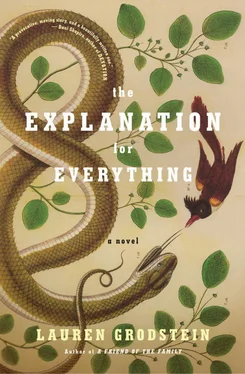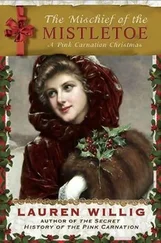Stapled to the note was the manuscript’s title page. The thing was called “Death and Immortality.”
Death and immortality, religion’s dangerous lie.
Andy turned to his laptop immediately to write to Hank via the lawyer:
Yes, I’d love the manuscript. And please, if you could send me Hank’s e-mail, his phone number, anything, I’d love the chance to talk to him. It’s been years and I haven’t known where to find him, but if you would be so kind as to pass his information along, I’d be appreciative.
As he was pressing “print,” he heard another tentative knock on his door. God, Lionel, go away.
“Professor Waite?” A female voice—not Lionel. Argh, but on the other hand, his light was on.
“Yes.”
Melissa Potter, in a protective position, slightly hunched, her backpack sliding over a shoulder. “You said this was a good time to meet?”
“I did?”
She looked alarmed. “To discuss my independent study,” she said. “I brought all these books,” she added, letting the backpack fall to the floor. “Is it still an okay time?”
Was it an okay time? What he wanted was to spend more time with Rosenblum, reread the note once or twice (what did he mean by “keeping up with yr dealings”?) and perhaps do a little Internet stalking. See what Rosenblum had been up to. He wasn’t like his students or his daughters, people who spent so much time online researching their friends and rivals they could name what everyone they knew ate for breakfast each morning. It had been a long time since Andy had poked around, looking for news on Rosenblum. But now he thought he’d spend an hour or two on the cause. And maybe that lawyer at Briggs Watson would give him something to go on.
“Professor?”
Andy looked up at the girl, sucking on her cross in his doorway. Didn’t your mother ever teach you it’s rude to stand in people’s doorways?
“Can I please come in?”
She took his blank look as assent, slumped into his office and sat heavily on a chair. Then she bent down and began retrieving book after book from her backpack, piling them up on the corner of his desk. Reluctantly, Andy put Hank’s letter back in its envelope, stuck it in his drawer. The books kept coming. They were all brand new and published by places he’d never heard of.
What would Rosenblum make of all this? Would Rosenblum ever have agreed to talking about intelligent design with this girl? He probably would have. Rosenblum loved a good fight, and he especially loved fighting with women. (Or maybe he wouldn’t have seen it as a good fight at all—the opponent was so uninformed, and so droopy.)
“So,” Andy said, “these are the texts you’re going to use for research?”
Melissa nodded, stuck her gold cross into her mouth, then let it fall. “I borrowed some of them from my church,” she said, bending again, fishing for more materials. “And some of them I ordered online. The bookstore didn’t have them. But it’s not like I was expecting them to. I mean, why would I expect diversity of opinion from a college bookstore?” She sat up with a smirk and a paperback in hand.
God Is a Rainbow. The cover, cheaply bound, showed a blurrily printed rainbow with a pot of gold at one end and a cross at the other.
“A rainbow? Is that a metaphor?”
She looked confused. “It’s my favorite. It was written by my pastor.”
“Ah.”
Adam’s Rib . The Macroevolution Myth . The Mystery of Intent, and this cover cribbed directly from the Sistine Chapel, except where God was supposed to be reaching out for Adam’s finger instead he reached for a test tube.
“How many do you have here? Have you read them all?”
“Um, I think I have nineteen. These are the ones I’ve finished,” she said, gesturing to the pile on his desk. “I thought I’d give them to you so you could get started.”
“Me?” The various piles of papers on his desk looked lopsided, ready to fall, his research grant oversized and heavy—he reached out to straighten it, avoiding Melissa’s narrowing gaze.
“How else are you going to understand my independent study? If you don’t read these books how will you know what I’m doing? Besides, I agreed to read your books.”
“Right,” he said. “Well, you understand I’m busy. And also, as professor, it’s my job to assign and yours to read.” He stopped fiddling with the stack, picked up The Macroevolution Myth.
“So maybe you could look at just a few? Like five or six?”
Andy grunted. “How is it possible,” asked the jacket copy, “for random mutations to turn one species into another? Is this the best Darwinians can come up with? Shouldn’t there be a better explanation to this most important of human questions?”
“I think you’ll like that one,” Melissa said, settling herself on the chair. “It’s pretty good. And here,” she said, flicking through her notebook, “I’ve outlined the dimensions of my study, the paper I’m going to write at the end. My thesis is that intelligent design is a more realistic alternative to Darwinian evolution, if you think that sounds okay. Or something—maybe you can make it sound smarter than that for me. I’m not sure I’m in love with ‘more realistic alternative.’ ” She pondered this for a moment. “But anyway I realized I never had you sign the paperwork, so I brought a pen, if you could just—”
“Do you even understand the basics of Darwinian evolution yet?” He channeled Rosenblum. “Have you read anything that I’ve asked you to read? Or are you going to start debating something you don’t even really understand?”
She hunched her shoulders, a silent harrumph. “I understand Darwinian evolution,” she said. “I read the books you assigned, and I took Bio 101 at County.”
“So what do you think it is, exactly?”
“Evolution? Uh, you know,” she said, sarcastic. “Survival of the fittest. Natural selection.”
“Right,” he said, “but what do those things mean?”
She sighed, heavily. She didn’t like being underestimated. “Single-celled organisms evolved over countless generations, via the accumulation of small genetic mutations. The organisms that survived and passed on their genes continued to breed, and the ones that didn’t went extinct. Eventually, these single-celled organisms evolved into all the different animals and plants and fungi and bacteria on the planet.”
“That’s right,” Andy said, pleased with her succinct response, having grown accustomed, when asking questions of undergrads, to much more hemming and prevarication.
“But just because I can define it doesn’t mean I believe it.”
“Because?”
“Because it’s patently ridiculous,” she said. She stopped fiddling with her necklace. “If you’re willing to accept that life came about because, I don’t know, lightning struck some organic material in the primordial soup—and this, by the way, is not something I’m willing to accept—then fine, that’s how life began. But to think that random mutations could be so miraculously beneficial as to create the eye, the wing, the lung—can’t you see how silly that is?”
“Melissa,” he said, “just because your books say it’s silly doesn’t mean your books are right.”
“Why are you willing to ridicule books you haven’t even read?”
“I’m not,” he said, then started again. “It’s just—books like these, with these unprovable arguments—” He stopped. He was going about this the wrong way. How would Rosenblum have done it? With more sarcasm, of course, but also he wouldn’t let the undergraduate frame the argument.
“Well?”
“Look, why couldn’t random mutations develop into an eye over eons? In fact, why wouldn’t they? If you started, say, with cells that just happened to be slightly more photosensitive than others, and if organisms that were able to detect light through these photosensitive cells had that much of an advantage, in a hostile world, over organisms that couldn’t detect light, why wouldn’t successive generations of selection refine those photosensitive cells into, you know—something like an eye?”
Читать дальше












